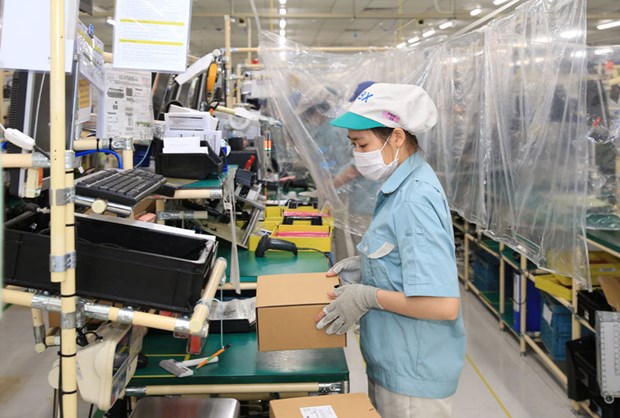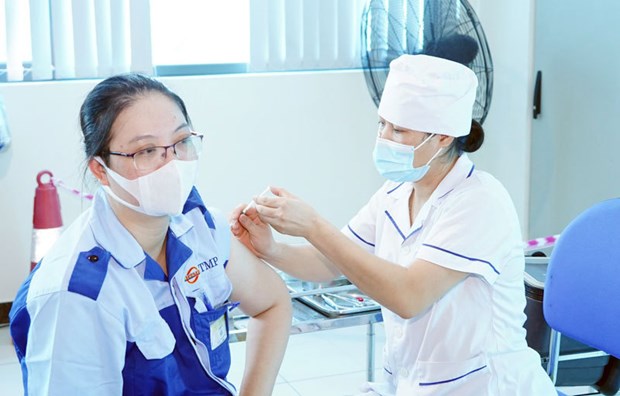Hanoi flexibly maintains production amid COVID-19
To maintain business operations amid social distancing order caused by the fourth wave of COVID-19 pandemic, it is necessary to pool the drastic involvement of local authorities, especially flexibly adopting plans to both fight the pandemic and prevent production disruption.
 Illustrative image (Photo: VNA)
Illustrative image (Photo: VNA) Hanoi (VNA) – To maintain business operations amid social
distancing order caused by the fourth wave of COVID-19 pandemic, it is
necessary to pool the drastic involvement of local authorities, especially flexibly
adopting plans to both fight the pandemic and prevent production disruption.
Difficulties faced by enterprises
Chairman of the Board of Directors of Son Ha Garment JSC in Son Tay town Pham Huy Ve said since August, the company has suspended operation to fight the pandemic. Though the “three on the spot” option was arranged, most of workers wished to come home because they are women residing in the town.
The company suggested cutting the number of local workers from 2,000 to about 500-800 who have been vaccinated, and arranging production in five independent workshops. It also seriously followed “One route, two destinations” strategy to complete remaining orders. However, the plan has yet to be approved by the local authorities, Ve said, adding that if delivery of orders is delayed, the company could lose hundreds of billions of VND or even the market if partners seek other suppliers.
Similarly, the TOMECO Mechanic – Electrical JSC based in Ngoc Liep industrial cluster in the outlying district of Quoc Oai also faced the shortage of workers as most of them do not stay on-site in line with “three on the spot” plan.
Head of the TOMECO’s personnel office Tran Thu Trang said as the cost of “three on the spot” plan is high while the prolonged pandemic could cause heavy burden on the company, she proposed allowing workers in unaffected areas to return home.
Chairman of the Board of Directors of the Vietnam National Textile and Garment Group (Vinatex) Le Tien Truong said the “three on the spot” model could only work for a short term and applicable for enterprises with wide factories and few workers. For apparel sector, it will be harder due to a large number of workers. Therefore, anti-pandemic plans need to be flexible based on common standards.
Statistics by the municipal Department of Industry and Trade showed that since the social distancing order is imposed, only 1,077 out of 3,600 manufacturing facilities in industrial clusters and 546 out of 661 enterprises in industrial parks are working.
Production plans need to be flexible
Deputy Minister of Industry and Trade Do Thang Hai said the “three on the spot” strategy previously proved successful in Bac Ninh and Bac Giang provinces, but it has shown shortcomings in other localities.
Difficulties faced by enterprises
Chairman of the Board of Directors of Son Ha Garment JSC in Son Tay town Pham Huy Ve said since August, the company has suspended operation to fight the pandemic. Though the “three on the spot” option was arranged, most of workers wished to come home because they are women residing in the town.
The company suggested cutting the number of local workers from 2,000 to about 500-800 who have been vaccinated, and arranging production in five independent workshops. It also seriously followed “One route, two destinations” strategy to complete remaining orders. However, the plan has yet to be approved by the local authorities, Ve said, adding that if delivery of orders is delayed, the company could lose hundreds of billions of VND or even the market if partners seek other suppliers.
Similarly, the TOMECO Mechanic – Electrical JSC based in Ngoc Liep industrial cluster in the outlying district of Quoc Oai also faced the shortage of workers as most of them do not stay on-site in line with “three on the spot” plan.
Head of the TOMECO’s personnel office Tran Thu Trang said as the cost of “three on the spot” plan is high while the prolonged pandemic could cause heavy burden on the company, she proposed allowing workers in unaffected areas to return home.
Chairman of the Board of Directors of the Vietnam National Textile and Garment Group (Vinatex) Le Tien Truong said the “three on the spot” model could only work for a short term and applicable for enterprises with wide factories and few workers. For apparel sector, it will be harder due to a large number of workers. Therefore, anti-pandemic plans need to be flexible based on common standards.
Statistics by the municipal Department of Industry and Trade showed that since the social distancing order is imposed, only 1,077 out of 3,600 manufacturing facilities in industrial clusters and 546 out of 661 enterprises in industrial parks are working.
Production plans need to be flexible
Deputy Minister of Industry and Trade Do Thang Hai said the “three on the spot” strategy previously proved successful in Bac Ninh and Bac Giang provinces, but it has shown shortcomings in other localities.
 Illustrative image (Photo: VNA)
Illustrative image (Photo: VNA) Enterprises also proposed allowing them to resume operations, from 30-100 percent as before the pandemic, depending on their safety conditions and the results of the pandemic prevention and control.
In a recent meeting with ministries and agencies, Prime Minister Pham Minh Chinh said the “three on the spot” strategy requires the drastic involvement of departments and agencies and initiatives of enterprises to tackle difficulties in implementation.
The Government, departments and agencies directed changing priority groups for vaccination, ensuring smooth goods transportation in combination with fighting the pandemic safely and effectively, as part of efforts to assist firms, he said.
He affirmed the Government’s consistent policy of achieving “dual goals” via harmoniously, reasonably and effectively combining the goals of fighting the pandemic and maintaining production and trade, and socio-economic development.
To prevent production chain disruption, authorities, especially in localities, need to take more flexible approaches to helping firms amid the pandemic, he said./.













